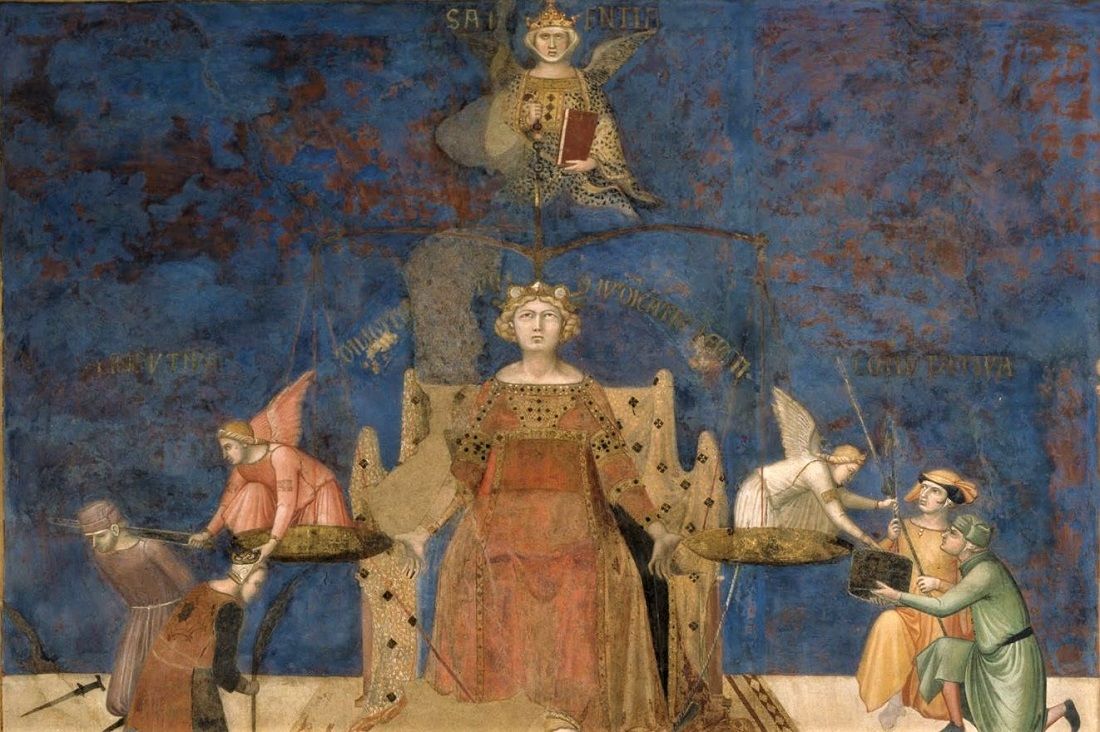Discussions of natural law and natural right inevitably include accounts of their historical genesis, and where they do not, then often a fictive genesis is assumed, in such a way as vitiates the substantive claims for either law or right that are being made. This is most evidently the case for modern natural right, since this manifestly has an origin—it has been asserted always in particular circumstances and within a particular conceptuality that help to determine the sense of the notion. But it is also the case for natural law, because any attempt to ignore its origins in the Classical and Medieval past, and especially its links to theology and metaphysics, inevitably denature it and produce a novel, modern doctrine that is often much more reducible to a modern natural rights doctrine than its proponents imagine.[1]
Therefore I will attempt, in this essay, to sketch in short compass an account of the historical development of natural right in relation to the older notion of natural law. My contention will be that the latter notion has, until recently, always been more dominant than the former, and that for a long time natural right was usually thought of in the context of natural law. Even where notions of subjective right started to become more important in the Middle Ages, early modernity and the Enlightenment, they were not, as yet, often subjectively founded in the will or capacity of the individual, but still within conceptions of an objective cosmic right order, however etiolated this had often become—thereby indeed encouraging a subjective foundation of the subjective. But even where they were so subjectively founded, beginning already within the Middle Ages themselves, natural right necessarily presented itself as a revised notion of natural law or of cosmic order, albeit now perversely construed as a pure regime of power and willing. In this way, the link of ius, whether viewed as objective right (or law) or as subjective right, with conceptions of divine government did not immediately disappear.
Moreover, notions of divine government imply not just the normative, but also the descriptive: not just how we should govern human society under divine norms, but also how this society is in fact governed by God, either with or despite our human intentions. Once natural law had become natural right according to a revised notion of divine rule, this providential aspect of his governance could not simply be ignored either, but was rather transmuted in a bifurcated way: either as the divine or natural distilling of order out of the chaos of individual choices, according to the “cunning of reason,” or else, in Rousseau’s model, which the French Revolution largely took over, as the human governmental mediation of the divine “general will” through the harmonization of perspectivally different human freedoms insofar as these can be made to agree in a “live and let live” coordination of negative liberties.[2] Thereby the “general will” of the human state results. Its risk, as we shall see, is state terror, whereas the risk of supposed natural coordination of diverse egotisms is anarchy and habitual criminality.
But in either case, a certain mutated theology still hovers. By contrast once, and really quite recently, a full secularization of rights theory is attempted, it becomes wholly unclear just why rights can be added to facts, what is the ground of their legitimation and in precisely what they should consist. In consequence, the ready assumption that one can oppose secular natural rights to sacral or metaphysical natural law starts to look questionable. It is more the case, even today, that one is talking rather about rival alternative theologies or metaphysical systems. And what is more, as I shall try to argue, when correctly understood natural law can appear to be the less dogmatic, more open and more intuitively correct metaphysical perspective: able, indeed, to incorporate whatever is (often ambivalently) valid in the modern development of natural or human right, while securing this gain more surely on an objective rather than subjective foundation, which is all too liable (as we shall see) to overturn right in the name of right. At the same time, natural law is able, as natural right is not, to consider also the equity of relational human situations and not leave these at the mercy of legal positivity and political utility.
By the same token, it does not hand history over either to an impersonal or a statist coordination, but rather returns it to a cooperative human work which seeks, by a kind of ecological faith, one might say, to search continuously for “the right way” for human beings to be among themselves and within the wider natural order. Again I want to submit that something that sounds shockingly theological is in fact more in tune with habitual human behavior as it remains, even today, than the dominant official secular theories which only hold back from the brink of a nihilism without either law or right by incoherent virtue of a lingering attachment to theories that logically require a theological grounding, however distortedly voluntaristic.
All this, finally, will be shown to have some bearing on the question of the relative primacy of notions of justice and right today, and specifically, in the case of Europe, of the relation of the EU to the European courts of Justice and of Rights respectively. This issue is in turn inseparable from the question of the legitimate scope of the rule of the nation-state and whether international order should be political as well as juridical and economic.
In terms of historical approaches to questions of natural right, one can approximately distinguish three main tendencies: the first is a “whiggish” or progressivist tendency to see a gradual development of notions of subjective rights all the way from Ancient Rome (and even, quite erroneously, the Bible)[3] until the present day. One main problem with this tendency is that it confuses the many examples of subjective natural ius to claim or to exercise with a grounding of these same rights in pure individual identity or self-assertion.[4] Equally, it tends to ignore the correlation of subjective right with conceptions of the enforceability of such right through sovereign political power, by projecting backwards a very recent notion of pure “human rights” that are purportedly conceived as no longer suspended within the aporetic space between the naturally given and the legally enactable.
In a very commendable, detailed and learned reaction against this tendency, Samuel Moyn has adopted a second approach to rights-history which one might describe as “archaeological” (he sometimes himself says “antiquarian”) insofar as he seeks to disinter different layers of legal time without imagining that he is uncovering the organic roots of what came later.[5] Rather, for his historiography, other conceptions and practices were dumped on top of the older levels, re-using their vocabulary misleadingly to different ends. Thus, to begin with in the case of Hobbes and Locke, “rights” were primarily about protecting property from arbitrary power, albeit at the price of establishing unqualified state sovereignty; in the revolutionary era, by contrast, rights were linked to the establishment of a state power which aimed to emancipate individuals from customary or social hierarchical control and to engender equality of opportunity; immediately before and after 1945 rights were radically reconstrued in Christian, natural law-based personalist and communitarian terms;[6] in the 1970’s they reverted, with a further secularizing twist, to a nation-state context, in association with natural liberation struggles; today, in further contrast, rights have become globalized and depoliticized as largely confined to preventing inhuman horrors (such as torture) rather than achieving more widespread social and political liberation.
In this way one could see Moyn’s approach as anti-genealogical. But a third, genealogical approach which I would want to stress at least equally, need not at all be blind to the instances of rupture and discontinuity. While eschewing any notion of a straightforward progressive development it nevertheless rightly takes note of the ways in which later conceptions of rights would be impossible without the moves involved in earlier ones and their sedimentation over a longue durée. Thus, for example, the contemporary “thin” notion of right as limiting the worst damage is clearly a long term derivative of the Hobbesian founding of politics upon a negatively distilled order that begins with human fear as the prime fact, besides early modern non-teleological and minimalist conceptions of ethics that have focused on “sympathy” with our shared human physical condition rather than on controverted claims for ultimate human purpose—as indeed Moyn himself has helped to show.[7]
Equally, it is somewhat wrong to suppose that the revolutionary account of rights, whether in the 1790’s or the 1970’s, is a simple reversal of the property-based account of right, as Costas Douzinas tends to argue.[8] Rather it is the case that property and revolution are twins. Just because the new prime duty of the state is to protect life and property, Hobbes, never mind Locke, claimed that the legitimacy of government lapses if it fails to do so.[9] This implies a new individual or mass right to rebellion which is quite different from traditional medieval “rights to resist,” which empowered lesser constitutional bodies to overturn higher ones if they had grossly lapsed in their exercise of responsibility—and indeed many interpreted the legitimacy of the rebel causes in both the English Civil War and the Glorious Revolution in these “ancient” terms.[10] Certainly it is the case that what one can anachronistically describe as the “liberalism” of Hobbes and Locke was concerned first with the freedom of inequitable property ownership as secured by the state with a monopoly on violence. But once such a state has started to remove the various particular liberties and customary privileges that had existed at a lower level, then inevitably “counter-rights” start to be asserted against the original rights—rights to extend the franchise in order that the state be not merely on the side of big property, rights to equality of entry into social and economic competition.[11] Thus, the revolutionary traditions have continued to be fixated on ownership, while demanding a more egalitarian access to it.
While, indeed, the non-statist traditions of socialism refused the language of rights in the name of distributive justice and social reciprocity,[12] welfarist social democracy has been largely concerned with rights as entitlements, and even Marxism remains focused on the rights-property-revolution triangle insofar as it thinks of a general will as controlling a collective property and suggests that equity means the “right” of the individual to receive all he needs, matched with the equal collective right of the general will to demand from each such individual the full measure of his means. For although Marxism recognizes the liberal revolutionary suppression of the social, it tends to reduce the social to an “immediate” Leibnizian coincidence of the individual with the species, downplaying the primacy of reciprocal bonds of agreement as to social value.[13] In both cases it would seem that the content of rights must be technologically determined according to supposedly objective criteria and that the operator of an ensuing social machine must be an evermore bureaucratic government.
As to the legitimacy of such a government, the natural rights perspective here encounters an aporia, as Costas Douzinas has explained well.[14] On the one hand, since modern right is at bottom power, legitimacy is grounded in de facto control; on the other, once this control is formally and legally recognized, then no other force may legitimately be used against it. This contradiction appears most glaringly to view in the opinions of both Kant and Hegel that, while revolution can never be justified (as it is a revolt against the positive sovereign guarantee of the very possibility of order, which is ultimately for both—despite Hegel’s qualifications—the securing of private dominium), history may retrospectively justify revolution since, once it has been successful, its new recognition of a de facto victory automatically accords legitimation. In this view, which is already in essence that of Hobbes himself, one can regard the force of revolution as both the reinsertion of founding nature into operationalizing polity and its theorization as a new covert theology of divine government.
This kind of truly critical perspective upon the liberal legacy, which exceeds the rather limited “immanent critique” usually exercised by the left, can help us to see the ways in which modern conservatism and modern liberal-leftism are locked into exactly the same rights-based paradigm.
EDITORIAL NOTE: This is the first installment, and introduction to, a six-part series by John Milbank on natural law and natural rights.
[1] This is true of the “new natural law” doctrine of John Finnis and Germain Grisez. For a critique see: Russell Hittinger, Critique of the New Natural Law Theory (South Bend, IN: UNDP, 1989).
[2] For the dependence of Rousseau here respectively on Leibnizian and Malebranchian metaphysics, see: Alexis Philonenko, Jean-Jacques Rousseau et la Pensée du Malheur (Paris: Vrin, 1984) [3 vols], plus, for a summary, Luc Rerry and Alain Renaut, Political Philosophy 3:From the Rights of Man to the Republican Idea, trans. Franklin Philip (Chicago Ill: Chicago, 1992), 52-55 and Patrick Riley, The General Will Before Rousseau: the Transformation of the Divine into the Civic (Princeton, NJ: Princeton 1986).
[3] See: Nicholas Wolterstorff, Justice; Rights and Wrongs (Princeton, NJ: Princeton, 2008), 65-131. It is by contrast obvious that the main perspective of the Hebrew Bible/Old Testament upon justice is as distribututional as that of Aristotle; see: for example, Ex. 23: 10-12; Deut. 14:20, 15:1-18, 23:20-21: Lev. 19:10-11, 23: 25-28, 25: 29-55; Numb. 35-36; Josh. 13-19, concerning the regulations of land usage. Moreover, God’s primary concern with the flourishing of his people as linked with their righteousness suggests eudaemonism more than deontology or utility. There is not much need to labour these points. Wolterstorff’s view cannot be historically plausible, as he attempts to force the Bible into the matrix of Lockean voluntarism and a distorted Calvinist covenantalism become artificial conventionalism.
[4] See: John Milbank, “Against Human Rights: Liberty in the Western Tradition” [longer version] in The Oxford Journal of Law and Religion, Vol 1, No. 1, April 2012, 203-234.
[5] Samuel Moyn, The Last Utopia: Human Rights in History (Cambridge, MA: Harvard, 2010); Human Rights and the Uses of History (London: Verso, 2014).
[6] Samuel Moyn, “Personalism, Community and the Origins of Human Rights” in Human Rights in the Twentieth Century ed. Stefan-Ludwig Hoffmann (Cambridge: CUP, 2010), 85-106.
[7] Samuel Moyn, “Empathy in History, Empathising with Humanity” in History and Theory 45 No. 3 (October, 2006), 397-415.
[8] Costas Douzinas, “Philosophy and the Right to Resistance” in The Meaning of Rights: The Philosophy and Social Theory of Human Rights, ed. Costas Douzinas and Conor Gearty (Cambridge: CUP, 2014), 85-105.
[9] Thomas Hobbes, Leviathan, Part 2, Chap 21 [114]. See also: Jeffrey R. Collins, The Allegiance of Thomas Hobbes (Oxford: OUP, 2004) for the revisionist view that Hobbes came to have Parliamentarian sympathies during and after the English Civil War.
[10] On this point see: Christopher A. Ferrara, Liberty: the God that Failed: Policing the Sacred and Constructing the Secular State from Locke to Obama (Tacoma, WA: Angelico, 2012), 74-79. Despite some exaggeration and imbalance, Ferrara presents cogently the case that the real enemy of both the American, as of the French Revolution remained Catholicism, and that therefore they were, as the Anglican conservative radical William Cobbett thought, first and last extensions of the Reformation.
[11] Therefore one can argue that in political terms “liberalism” was initially authoritarian and only later democratic.
[12] For the non-liberalism and therefore also the non-leftism of 19th century socialism, see: Jean-Claude Michéa, Les Mystères de la Gauche (Paris: Flammarion, 2014).
[13] Karl Marx, “On the Jewish Question,” in Early Writings (London: Penguin, 1975), 229-234.
[14] Douzinas, “Philosophy and the Right to Resistance.


